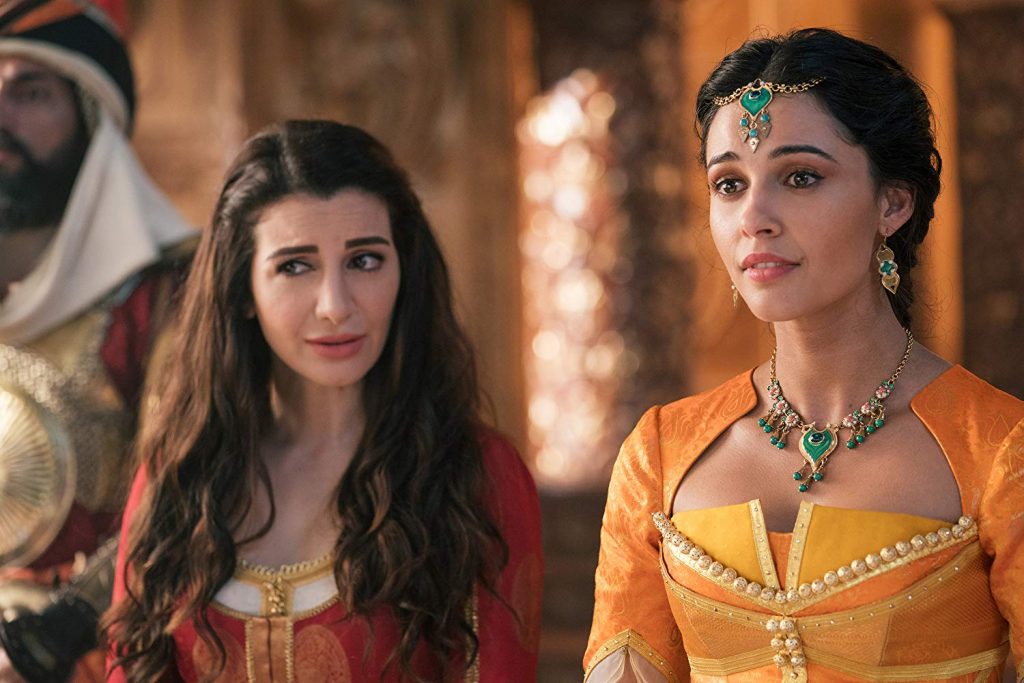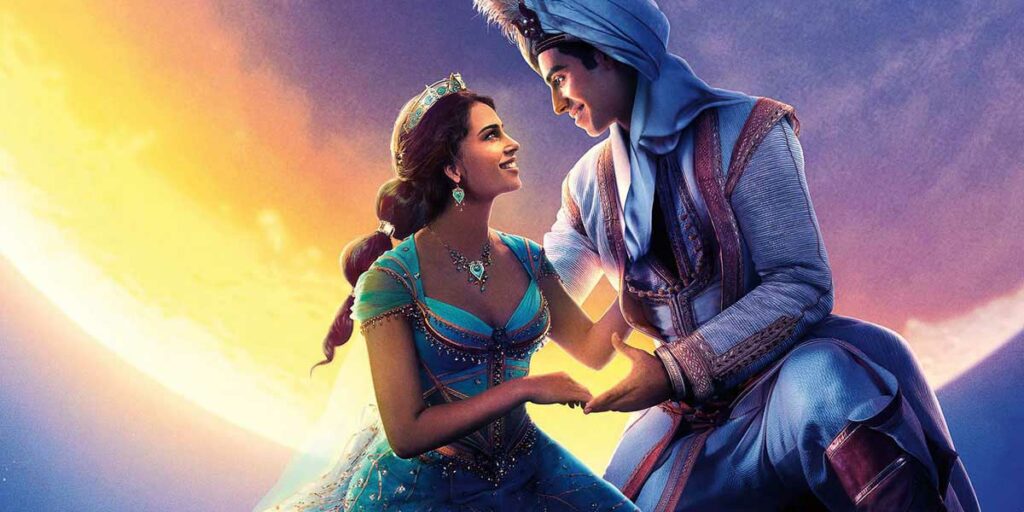Guy Ritchie’s Bollywood-style 2019 remake of Disney’s Aladdin has impressive CGI and entertaining dance routines, but it fails to move the audience.
In the past decade, Walt Disney has gotten us used to seeing live action remakes of its most popular animation from the past. It all started with 101 and 102 Dalmatians in the 1990s, then came Tim Burton’s Alice in Wonderland (2010), followed by a long series of revisitations of our favourite classics. And, while most of the live action films are still in the making (the Studios have already announced the upcoming release of at least fifteen more remakes), it’s in the past five years that this trend really began to take off, and with that came a series of enjoyable stories, together with more than one forgettable attempt and a few pleasant surprises.
If Cinderella (2015) and Alice Through the Looking Glass (2016) certainly weren’t the most remarkable live actions to ever hit our screens, it’s also true that Beauty and the Beast (2017) gave us a more independent Belle with a moving backstory that made a lot of sense, and Maleficent (2014) turned an already intriguing villain into one of the most beloved, relatable, exquisitely misunderstood characters in Disney history.
Overall, Disney has given us an equal mixture of surprises and disappointments, which is why, even before its official theatrical release, Guy Ritchie’s Aladdin had already caused quite a stir among die-hard Disney fans. Contrasting opinions started swarming the web when the first pictures came out, months ago, and the reason is that the film that marked the peak of Disney’s Renaissance meant a lot of different things to entire generations. Not only it gave us unforgettable songs, iconic sidekicks and one of the most believable love stories we had ever seen in animation: it was, in all respects, Robin William’s “Show”.
To this day, the 1992 classic still encapsulates the very essence of the sharp-witted, chameleonic actor, from the very first scene in which he surprises us as a merchant and tries to sell us a “hookah and coffee maker that also makes Julienne fries” to the very end, when he literally draws the curtain on the story. And, in between all that, he keeps us entertained as the Genie, with his brilliantly improvised lines and hilarious impressions, so much that, by the end of the film, we don’t just wish we had a “Friend Like Him”: we know we do. The original Aladdin wasn’t perfect, but it had an incredible amount of heart: it brought all our emotions to the surface and spoke to us in ways we couldn’t define. Which is exactly what Guy Ritchie’s remake fails to do.
Don’t get me wrong: the new Aladdin is not a bad movie altogether. The screenwriters’ attempt to give these characters a backstory is admirable to say the least. Aside from the obvious cultural inacurracies, the 1990 film was in desperate need of improvement in terms of storyline and character development. If we think about it, all we knew about its protagonists was that Aladdin was a “street rat” with no parents who dreamed of a better life, and Jasmine was a princess with no mother who wanted to marry for love. As we focused on their love story and watched them try to defeat Jafar (another character with an obscure past and a likeable sidekick animal), not only it was easy not to notice that we did’t really know much about them at all, but, in a way, we didn’t even need to. After all, an animated film doesn’t always need to make complete sense: as long as the magic is there, it doesn’t matter if some of the details are missing.
If animation doesn’t always need to be realistic, live action is a whole different story, and Guy Ritchie rises to the challenge by taking the characters we love and giving them more depth. If the original Jasmine was a princess who kept refusing her many suitors, her 2019 counterpart is an independent, fierce young woman who is determined to be a sultan. Her world doesn’t revolve around the men in her life (her father, Jafar and her potential future husband): she is a resourceful monarch who cares about her future reign and is actively trying to have a positive impact on her people. This Jasmine is opinionated, wise and, most of all, so very human, and Naomi Scott is absolutely perfect for the role, as this princess in not only incredibly believable but also, without a doubt, the most well-developed character in the film.
If the decision to partially stray from the original storyline led to the development of a well-rounded female protagonist, the same cannot be said for most of the other leading characters. From Aladdin (Mena Massoud, of Wish You Were Here) to Jafar (Marwan Kenzari), from the Genie (Will Smith) to the Sultan (Navid Negahban, aka Homeland‘s “Abu Nazir”) and even CGI Abu and Iago, something is missing. And it’s not simply a matter of casting choices (although, in Jafar’s case, it may very well be) or narrative alone: in fact, if we were to look at these characters on paper, every single one of them would make perfect sense.
21st Century Aladdin is much more realistic, and Jafar is not just evil for evil’s sake: as absurd as they may be, his requests are much more grounded in reality, just like his sidekick Iago is not just there for comic relief but has a relevant role too. Every single detail checks out: these characters are even more believable than their predecessors, so the story should flow perfectly well, and yet it doesn’t. Simply put, if there’s one thing that all these characters have in common, is that they are not likeable at all.
Guy Ritchie’s Aladdin tries really hard to please, and, at first, it really does. Agrabah is a feast for the eyes: we are in awe of its colours, and there is so much to look at that we can almost smell the spices while passing by its busy market stalls. We familiarise with the city’s colorful streets as we follow Aladdin escape from the guards on the many videogame-like street chases, and, once we get into the Palace, we are mesmerised by absolutely everything we look at, from the princess’ clothes to the equally bizarre and entertaining Bollywood-like dance sequences. And then comes the Genie, with “A Whole New World” of special effects and magic tricks. An incredible job has been done in terms of musical arrangements, dance routines, CGI and set design, but, as visually breathtaking as Aladdin is, the one thing it lacks is an emotional connection with its characters.

There are a few exceptions, of course: Jasmine’s handmaiden Dalia (Nasim Pedrad) is a much needed sidekick for the princess and is responsible for most of the genuinely funny sequences in the film, while the Magic Carpet is a neverending source of cuteness and the pet we’d all love to have, but that’s about it. Most of the other characters, Aladdin included, are extremely one-sided, and, as we jump from an action scene to the other, we are not given any reasons why we should actually like them. What’s missing are all those genuinely endeering moments that made us establish a bond with the original characters in the first place. We don’t get to see the slow development of a love story in which a boy and a girl from different backgrounds find out that they have more in common than they thought: what we do see is a first meeting full of unfortunate jokes and inappropriate remarks that only serve to show Aladdin‘s complete lack of personality, together with a rehearsed dance scene which is more about the Genie showing off than about Aladdin and Jasmine actually getting to know each other.
If we are given no reasons why our two protagonists should actually like each other, the same goes for Aladdin and the Genie. Not only we don’t get any of those important scenes that would make us realise that the bond they have is very real and goes way beyond circumstancial friendship, but the Genie himself is a very hard character to figure out. At times detached and uninterested, at times wacky and overly energetic, at times tired and unenthusiastic and always self-centered and egotistical, this Genie appears to possess an abundance of contrasting personalities. The task of portraying an iconic character that has been played so well by one of the most beloved actors in cinematic history was a challenge, and Will Smith should be given the credit he deserves not only for trying, but also for adding a few original elements, such as the arrangement in “Friend Like Me” and a more than one entertaining scene. The real shame is that, underneath it all, the Genie’s true personality remains well-hidden under a surface of eccentricity, making it nearly impossible for audiences to warm up to him.
If there’s one thing that Disney taught us in the past is that not everything needs to have a rational explanation in order to make sense: sometimes all we need is a little bit of magic. The original Aladdin had many flaws, but it was also magical and entertaining. Not only was it pure fun, but it also had values to teach and, most of all, it was full of heart. And, while Guy Ritchie’s live action movie might be a better film in terms of special effects, dance routines and perhaps even structure, “heart” is exactly what it doesn’t have. It is an admirable revisitation of a classic tale that will draw you in, entertain you with exciting dance routines and take you on a visually impressive journey through the colorful streets of Agrabah, but it will ultimately leave you with the sudden urge to rewatch the original film over and over again.
Aladdin is now available to watch on Disney Plus.

